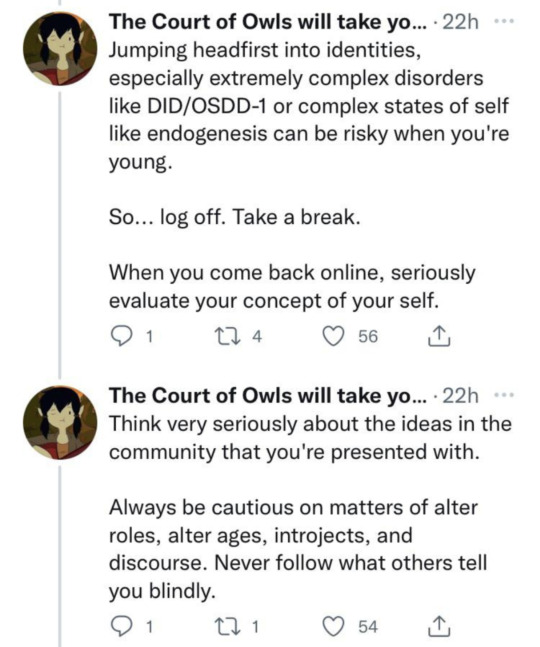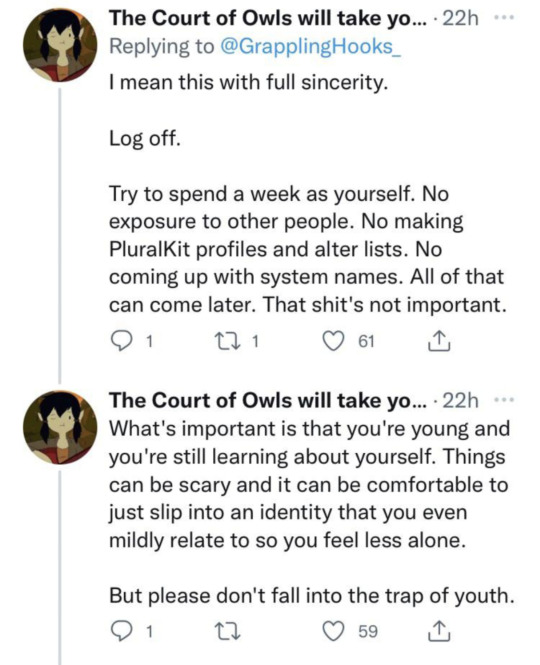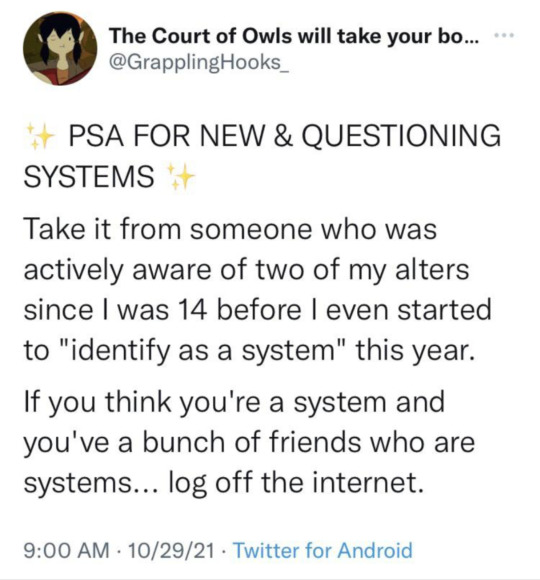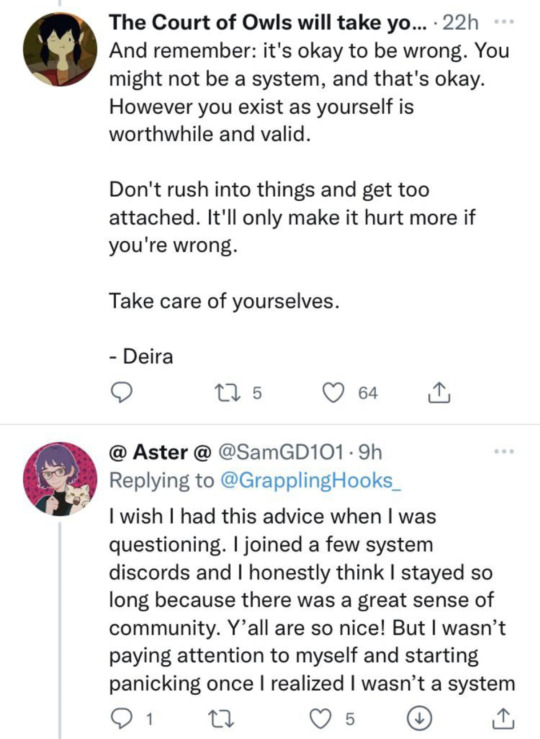Don't wanna be here? Send us removal request.
Text
Well obviously I can’t have chronic fatigue, that’s a real problem for real disabled people that’s diagnosed by doctors probably. Clearly I just have some sort of perpetual exhaustion issue, that is also almost certainly my fault somehow
67K notes
·
View notes
Text




A lot of people online follow a sort of "template" with DID, including making parts lists, using pluralkit or otherwise always having it known who's fronting, and being very openly a system all the time, among other things.
And this isn't wrong! But it's also far from the majority. Many people with DID, myself included, treat our DID differently. However, since the folks above are the ones most actively and openly posting online, it can feel like that's how everyone experiences DID. That was really overwhelming for me when I first got my diagnosis, because I didn't relate to the way a lot of people acted and thought.
My biggest advice for folks who either are diagnosed or are considering whether they have a dissociative disorder, or any other disorder really, is to take time for yourself first. Figure out independently what works best for you and your system. The internet will still be here. The community will still be here. Peer pressure isn't always a conscious thing. You can feel the pressure all by yourself.
#it's been like 10 years and i still don't know anything lol#better understanding of my trauma history? sure. 100%#literally anything else? no
3K notes
·
View notes
Text
Whenever an ugly feeling arises in me, maybe resent, greed, insecurity, etc. I just have to laugh and think to myself, this is what being alive is and I don’t deny my capacity for ugliness, in fact I store my faith in it because that same awareness of my own ugliness is the place I go to when I am aware of my own beauty. I have all the time in the world to sort it out, that’s the thing with self trust. I don’t hide from others and I don’t hide from myself, where there is ugliness I observe it and I don’t turn away.
27K notes
·
View notes
Note
hi, I hope you're doing well. This is a genuine question, english isn't my first language so I hope tone doesn't come off as confrontational. I'm confused by the advices "work on communication" and "don't focus on different parts" you're supposed to talk to each other to know what's going on outside, fill in memory gaps, but without getting to know them more? hope I'm not rude, only confused. I can't afford therapy yet so I'm trying to understand what I should do until then *1/2
*2/2 we’re focused on getting a job, and finding who’s good at interviews and who writes the best emails has helped. should we just do it no matter what? one that could calm a little really helped at the last job, its better to leave it and find someone to do that instead? we’re afraid of telling people, the first time one copied our alters and second she tried to exorcise us. I hope this isn’t rude or that it should be obvious. thank you and I hope you have a great weekend
Hi!
You’re fine! You’re not being rude at all. I can see how it would be a bit confusing, especially if English isn’t your first language. That said, what you’re describing sounds fine. All of your alters working together to improve your life is a good thing and exactly what we’re advocating for people to do!
It’s important to work with one’s alters to the extent that it improves internal and external functioning. This could include:
Working to build communication and cooperation with alters
Reducing amnesiac barriers
Making sure that all of your alters’ needs are met
Acknowledging that all of your alters’ needs, wants, thoughts, and feelings are important and relevant to you as a whole
Helping your alters to orient to the present
Encouraging your alters to take an active interest in your life and relationships
Reducing unhealthy behaviors from your alters
Processing trauma with the help of the alters who hold it
Making use of alters’ specialized skills and abilities to juggle life
Sometimes, those things require getting to know your alters as “individuals.” For example, if an alter has a name, it’s usually best to use it (or at least give them another name to use if their name is harmful due to its association with trauma)! If they have an age, it can help to keep that age in mind when interacting with them because it might help you to better understand their needs and how they’re likely to view and interact with the world. Their likes, dislikes, preferences, and opinions are no less important than yours. Letting them get to know others can help to encourage them to take an interest in your life and improve their social skills. Especially if a system has no intention of integrating, learning to work with one’s alters as a team is a useful skill to have!
What isn’t healthy is focusing on alters to the extent that it’s prioritized over healing or external life. This could include:
Not looking to form external relationships because one considers their alters their friends or partner
Constantly thinking about one’s internal world instead of doing something productive or meaningful externally
Focusing on how alters present as individuals instead of spending time mastering coping skills or preparing for trauma work
Refusing to accept that alters are all parts of one mind
Refusing to accept that what happen(s/ed) to one alter happen(s/ed) to all alters
Refusing to taking full responsibility for all of one’s alters actions
Being reluctant or afraid to move forward in healing because it will make alters less distinct or separate
Feeling that having unique alters is a substitute for actually being a unique or productive individual
Sometimes, the line between these things can be thin. Someone can think that they’re working on forming a relationship with their alters when they’re actually avoiding engaging with necessary aspects of external life. Someone can try to encourage their alters to engage more with their daily life and form relationships without realizing that they’re placing too much emphasis on the involvement of alters and not enough on the actual external life or relationships. As well, sometimes people can have trouble accepting that their alters are part of them or taking ownership of what their alters contain because they’re not ready yet to admit that the trauma happened to them as well or to accept the scope of how the trauma affected them.
It can be a process, and we don’t want to downplay that. Everyone has their own path that they take in their own time. However, we do want people to be aware of where a healthy goal is for systems regardless of whether or not they plan to integrate. Tumblr tends to treat both healthy and unhealthy ways of focusing on one’s system as equivalent and encourages aspects of each indiscriminately, and we want people to be aware of why that won’t help them in the long run and what healthier options are.
I hope that this helps, and we wish you the best of luck!
Katherine of Those Interrupted
52 notes
·
View notes
Text
>Addressing stigma, the authors point out that clinicians are among the “worst offenders” in perpetuating negative stereotypes. They frequently pathologize individuals with this diagnosis, treating them as just “another borderline.” This can lead to inappropriate or even inadequate care, as “emotional instability” is sometimes used as grounds for excluding individuals from treatment.
THIS LITERALLY HAPPENED TO ME. A social worker excluded me from a program because I might be "combative" based on diagnosis alone
#i don't want to police labels for other people if it is helpful for them but for me#(someone who was diagnosed with BPD multiple times as a Fucking Minor) (yes this is extremely unethical. still happened to me)#it was literally just a 'problem patient & incurable' label. that i was handed at the ripe old age of fifteen.#fuck this diagnosis i don't think it should even be Considered for anyone 21 or younger
3K notes
·
View notes
Note
Do you know any credible sources on “programming” specifically? I am unclear on the actual definition, I think I went through some things that could be described that way but I don’t understand the difference between “programming” and “grooming” trafficking victims. I previously have only really heard explanations on what programming supposedly is from untrustworthy, conspiracy-ish sources talking about like government mind-control in pop music, but I don’t want to disregard the whole concept if there is better information or research on it.
The term "programming", as I understand it, has fallen out of academic favor due to the connections you mention. Because of this, its definition is somewhat fluid, but I'd generally define programming as:
"The process of using trauma-induced dissociation to implant specific sets of instructions, messages, learned associations, and triggers to produce desired behavior in a victim. It is, at its essence, an extreme form of conditioning, and relies on the use of dissociated parts (alters) to effectively control the victim's mind."
Another source, ra-info.org (one of the oldest sites about RAMCOA on the internet) puts it this way:
"Programming refers both to the process of teaching part of the mind unquestioned obedience and to the content of what is taught. Thus you can say that a person has been programmed to suicide under certain conditions, or you can talk about a suicide program that is triggered (activated) by certain words or conditions."
Grooming for trafficking purposes may or may not use programming methods, as programming requires a level environmental control that not all situations can muster. Programming also typically involves... Well, weirder, more intense stuff. For example, most trafficking operations are not going to use spin programming, but rely more on basic cause & effect. Additionally, grooming may have more of a focus on positive reinforcement, while programming typically doesn't.
And programming is just one end of a large spectrum that encompasses many forms of conditioning, grooming, and abuse; some cases may have some elements of programming (like manipulating dissociative responses to create alters) while not having the structure necessary to do a good job of it. (That's what our case looked like!) Trafficking organizations may not have the money, access, space, or time to implement full programs.
But sources that mention programming by name do exist, and most give their own definition of programming. I'll throw them under a cut because this post is already getting long.
Dialogues With Forgotten Voices by Harvey Schwartz (2000). Generally a great resource so far, I haven't read all of it but what I have gone through is enlightening. Programming is mentioned all through the book but 330 is where more specifics are discussed. Index starts at page 499 so you can peruse topics by your own discretion. His other book, The Alchemy of Wolves & Sheep, covers similar ground (RAMCOA) but with a unique focus (forced perpetration). It's in my pinned post.
Both of Alison Miller's Books, Healing the Unimaginable (2011) and Becoming Yourself (2014). Many survivors swear by these books, and they use the term "programming" throughout. I haven't read these yet but you'll see them referenced constantly.
Safe Passage to Healing by Chrystine Oksana (1994). Another "classic", another book I haven't touched yet. Discusses programming quite a bit and is meant for survivors.
Many of Steven Hassan's works use programming in a slightly more "casual" manner from what I can see—referring to brainwashing at any age in the contexts of cults, as that's Hassan's focus—but helpful for many regardless.
Spin Programming: A Newly Uncovered Technique of Systematic Mind Control by John Lovern (1993) and Common Programs Observed in Survivors of Satanic Ritualistic Abuse by Neswald, Gould, and Graham-Costain (1991). Lumping these together despite the different authors because they're in my "I can't 100% trust these but the information is, in general, useful and many survivors share these" category. The first also includes sketches by survivors, but we're partial to the second one because we don't have spin programming.
On top of this list, there are HUNDREDS of sources that do not use the term "programming" but regardless, refer to similar processes. Too many to list. I hope this is a good starting point though!
141 notes
·
View notes
Text
the post that was like talk to yourself like you’re a child while doing tasks is so real. Like not even in an infantilizing way but just in a let’s get through this way
717 notes
·
View notes
Text
desire is not the enemy. never is and never has been. can desire be shaped by unpleasant, or even awful, beliefs? yes, but so can any other emotion. the moment you pin the cause of the issue on 'desire' in and of itself, you lean into unhelpful cultures of shame. and god knows shame never gets us anywhere good. desire is not the enemy and we don't get anywhere by acting like it is
273 notes
·
View notes
Text
lore dropping is kinda crazy because sometimes when I’m mid conversation I realize that actually did happen to me
34K notes
·
View notes
Text
what they don't tell you about making friends is you gotta be a lil annoying. you gotta push past the fear of "what if they don't want to talk to me" and simply ask someone how their day is going, send a meme. you cannot connect to people if you're both just awkwardly waiting for the other to start.
89K notes
·
View notes
Text
additionally i think a lot of us remain helplessly dependent on self flagellation and punishment believing it to be discipline/self control because we are not taught to believe that care and deliberate healing and patience and attention are disciplines themselves
15K notes
·
View notes
Text
its always like be careful this song might become a memory. this cologne might become a memory. this brand of beer might become a memory. i time travel all the time
31K notes
·
View notes
Text
Crazy thing about #healing #recovery Small Victories is when you'll have some shit going on that's like, saying this would involve admitting how you used to be doing. You know? Like hey guys good news I'm gonna change my bedsheets this year
30K notes
·
View notes
Text
Speaking as a survivor of child sex abuse: the world would be a lot better if yall spent less time talking about the ways in which pedophiles should be punished and more time supporting survivors and preventing abuse
I get it, punishment can feel cathartic. I’ve certainly spent time imagining all the ways in which my own abuser might be punished. But ultimately, him dying, or being jailed, or publicly shamed, isn’t actually going to help me nor will it stop more kids from getting hurt in the future.
I don’t want more prisoners. I want free therapy with trauma informed counselors. I want better sex education for young children that teaches them about consent and body autonomy. And I want a society in which I can openly discuss my trauma, or at least as openly as yall discuss the evils of pedophiles
23K notes
·
View notes


